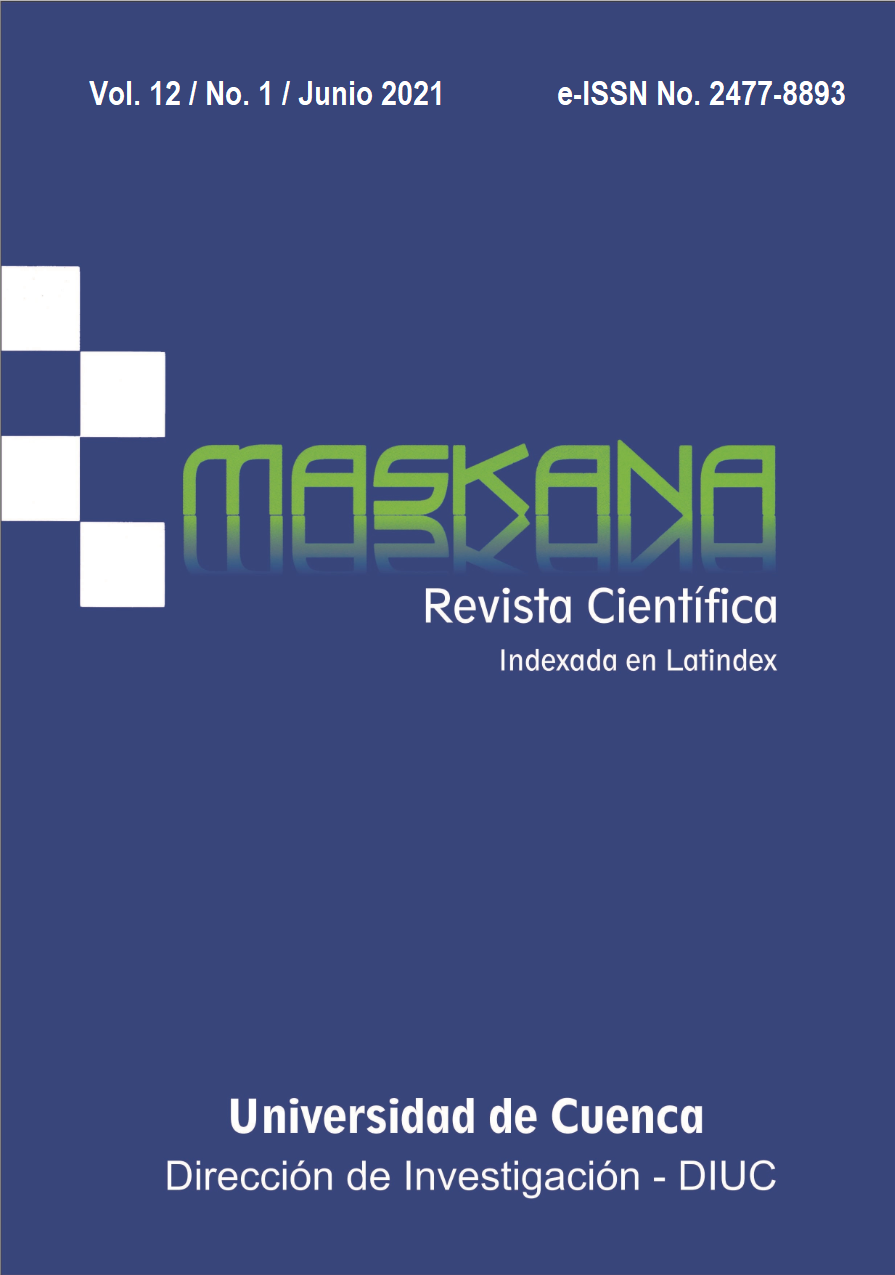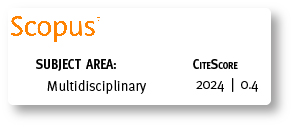Adolescent self-concept according to their sociodemographic and parental characteristics
DOI:
https://doi.org/10.18537/mskn.12.01.02Abstract
Adolescence implies important psychosocial changes, one of them is the development of the self-concept that takes hold at this stage in a familiar, academic, and social context. The objective of the study was to analyze the dimensions of the self-concept of adolescents from Cuenca, based on: i) the sociodemographic characteristics: sex, schooling, institutional support and the family typology of the adolescents, ii) the sociodemographic characteristics of the parents: working hours, marital status and educational level. 1085 schooling adolescents between 15 and 18 years old from the city of Cuenca participated, the Self-Concept Scale Form 5 was applied (García & Musitu, 2014). The results reported that Cuenca adolescents present scores above the 50th percentile in the academic and physical dimension; followed by the family and emotional dimension, while the social dimension reports a score slightly below the 50th percentile. Regarding gender, men present a higher score in the social and familiar dimension compared to women, who present a better academic, emotional, and physical self-concept. According to schooling, adolescents in the third year of high school show a physical self-concept and those who attend private institutions a better academic and family self-concept, as do adolescents whose parents have a married marital status and a postgraduate level of studies. In conclusion variability of the dimensions of adolescent self-concept is explained by the presence of the sociodemographic characteristics of adolescents and their parents.
Downloads
Metrics
References
Álvarez, A., Suárez, N., Tuero, E., Núñez, J., Valle, A., & Regueiro, B. (2015). Implicación familiar, autoconcepto del adolescente y rendimiento académico. European Journal of Investigation in Health, Psychology and Education, 5(3), 293-311.
Barrios, D., Gómez, M.A., & Barriopedro, M.I. (2017). Análisis del autoconcepto físico en estudiantes de enseñanza física. Revista de la Psicología del Deporte, 26(2), 45-53.
Cantón, I., Valle, R., Arias, A., Baelo, R., & Cañón, R. (2010). Retos educativos en la sociedad del conocimiento. Union Europea.
Castaño, M., Sánchez, M. P., & Viveros, E. F. (2020). Los roles en las dinámicas familiares de las familias homoparentales. Revista Latinoamericana de Estudios de Familia, 12(2), 153-174. https://doi.org/10.17151/rlef.2020.12.2.9.
Cazalla, N., & Molero, D. (2013). Revisión teórica sobre el autoconcepto y su importancia en la adolescencia. Revista Eléctronica de Investigación y Docencia, 10, 43-64.
Cleric, G., Elgie, Á., Gago, L., & García, M. (2020). La contribución del entorno socioeconómico al autoconcepto y percepción infantil de las pautas parentales de crianza. Revista de Psicología y Educación, 15(1), 87-97.
De La Torre, M.J., Cruz, Casanova, P.F, Villa, M., & Cerezo, M.T. (2013). Consistencia e inconsistencia parental: relaciones con la conducta agresiva y satisfacción vital de los adolescentes. European Journal of Education and Psychology, 6(2), 135-149.
Delgado, B., Inglés, C. J., & García-Fernández, J. M. (2013). Social anxiety and self-concept in adolescence. Revista de Psicodidáctica, 18, 179-194. https://doi.org/10.1387/RevPsicodidact.6411
Derdikman-Eiron, R., Indredavik, M. S., Bratberg, G. H., Taraldsen, G., Bakken, I. J., & Colton, M. (2011). Gender differences in subjective well-being, self-esteem and psychosocial functioning in adolescents with symptoms of anxiety and depression: Findings from the Nord-Trøndelag health study. Scandinavian Journal of Psychology, 52, 261–267.
Erikson H., E. (1992). Identidad, juventud y crisis. Madrid: Taurus
Esnaola, I., Goñi, A., & Madariaga, J. M. (2008). El autoconcepto: perspectivas de investigación. Revista de Psicodidáctica, 13(1), 179-194.
Esnaola, I., Rodríguez, A., & Goñi, E. (2011). Propiedades psicométricas del cuestionario de Autoconcepto AF5. Anales de Psicología, 27(1), 109-117.
Fernández Ortiz, D. S., & Samaniego Reinoso, M. M. (2020). Influencia del control psicológico parental en el desarrollo del autoconcepto en adolescentes de tres unidades educativas fiscales en Cuenca en el periodo 2019-2020 Tesis de Grado. Universidad de Cuenca. http://dspace.ucuenca.edu.ec/handle/123456789/33996
Fuentes, M. C., García, F., Gracia, E., & Lila, M. (2011). Autoconcepto y consumo de sustancias en la adolescencia. Adicciones, 23, 237-248.
Fuentes, M. García, F., Gracia, E., Alarcón, A. (2015). Los estilos parentales de socialización y el ajuste psicológico. Un estudio con adolescentes españoles. Revista de Psicodidáctica, 20(1), 117-138. https://doi.org/10.1387/RevPsicodidact.10876
Garaigordobil, M., & Durá, A. (2006). Relaciones del autoconcepto y la autoestima con la sociabilidad, estabilidad emocional y responsabilidad en adolescentes de 14 a 17 años. Análisis y Modificación de Conducta, 32(141), 37-64.
García, J. (2002). Prácticas educativas familiares y autoconcepto. Estudio con niños y niña de 3, 4, y 5 años. Universidad de Valladolid. Departamento de Psicología. Tesis doctoral.
García, F., & Musitu, G. (2014). AF5: Autoconcepto Forma 5. Madrid: Tea Ediciones.
García, F., Martínez, I., Balluerka, N., Cruise, E., García, O., & Sierra, E. (2018). Validation of the Five-Factor Self-Concept Questionnaire AF5 in Brazil: Testing factor structure and measurement invariance across language (Brazilian and Spanish), gender, and age. Frontiers in Psychology, 9, 1-13.
García, J., & Román Sánchez, J. (2005). Prácticas educativas familiares y autoestima. Psicothema, 17(1), 76-82.
Gasa, V., Pitsoane, E., Molepo, L., & Lethole, P. (2018). The effect of families’ socioeconomic status on the self-concept development of learners. Early Child Development and Care.
González-Pienda, J.A., Núñez Pérez, J.C., Álvarez, L., González-Pumariega, S., Roces, C., González, P., Muñiz, R., & Bernardo, A. (2002). Inducción parental a la autorregulación, autoconcepto y rendimiento académico. Psicothema, 14, 853-860.
Goñi, A., & Fernández, E. (2008). Educational support for enhancing physical self-concept. Problems of Education in the 21st Century, 6, 30-41.
Heatherton, T. F., & Wyland, C. L. (2003). Assessing self-esteem. In S. J. Lopez & C. R. Snyder (Eds.), Positive psychological assessment: Handbook of models and measures (pp. 219-233). Washington DC: American Psychological Association.
Inda-Caro, M., Rodríguez-Menéndez, C., Fernández-García, C., & Viñuela-Hernández M (2020). Rol de las metas parentales orientadas al logro de la tarea en el autoconcepto de adolescentes universitarios. Revista Iberoamericana de Diagnóstico y Evaluación, 56(3), 143-158. https://doi.org/10.21865/RIDEP56.3.11
Iniesta, A., & Mañas, C. (2014). Autococncepto y rendimiento académico en adolescentes. International Journal of Developmental and Educational Psychology, 2(1), 555-564.
Martínez, M., Estévez, E., & Cándido, I. (2013). Diversidad familiar y ajuste psicosocial en la sociedad actual. Revista Psicologia.com,17(6).
Mérida, R., Serrano, A., & Tabernero, C. (2015). Diseño y validación de un cuestionario para la evaluación de la autoestima en la infancia. Revista de Investigación Educativa, 33, 149-162. http://dx.doi.org/10.6018/rie.33.1.182391
Mistry, R., Stevens, G., Sareen, H., De Vogli, R., &Halfo, N. (2007). Parenting-related stressors and self-reported mental health of mothers with young children. American Journal of PublicHealth, 97 (7), 1261-1268.
Montroy, J. J., Bowles, R. P., Skibbe, L.E., McClelland, M. M., & Morrison, F. J. (2016). The development of self-regulation across early childhood. Developmental Psychology, 52(11), 1744. https://doi.org/10.1037/dev0000159
Moreno, J. A., Moreno, R., & Cervelló, E. (2017). Relación del autoconcepto físico con las conductas de consumo de alcohol y tabaco en adolescentes. Adicciones, 21(2), 147-154.
Morsy, L., & Rothstein, R. (2015). Five Social Disadvantages that depress student performance: Why schools alone can't close achievement gaps. Report. Economic Policy Institute.
Neidhöfer, G., Serrano, J., & Gasparini, L. (2018). Educational inequality and intergenerational mobility in Latin America: A new database. Journal of Development Economics, 134, 329-349. https://doi.org/10.1016/j.jdeveco.2018.05.016
Oliva, A., Arranz, E., & Parra, A. (2014). “Family structure and child adjustment in Spain”. Journal of Child and Family Studies, 23(1), 10-19.
Oudhof, H., Mercado, A., & Robles, E. (2018). Cultura, diversidad familiar y su efecto en la crianza de los hijos. Estudios sobre las culturas contemporáneas, 14(48), 1-19.
Pichardo, M. C., & Amezcua, J. A. (2001). Importancia del autoconcepto y el clima familiar en la adaptación personal. Revista Galego-Portuguesa de Psicoloxía e Educación, 7, 181-191.
Putnick, D. L., Bornstein, M. H., Hendricks, C., Painter, K. M., Suwalsky, J. T. D., & Collins, W. A. (2008). Parenting stress, perceived parenting behaviors, and adolescent self-concept in European American Families. Journal of Family Psychology, 22, 752-762.
Rangel, Y. S., Mayorga, D., Peinado, J. E., & Barrón, J. C. (2017). Actividad física, autoconcepto físico y bienestar psicológico en adolescentes universitarias mexicanas. Revista de la Psicología del Deporte, 26(2), 61-69.
Reigal, R., Videra, A., Parra, J. L., & Juárez, R. (2012). Actividad físico deportiva, autoconcepto físico y bienestar psicológico en la adolescencia. Revista Retos, nuevas tendencias en Educación Física, Deportes y Recreación, 22, 19-23.
Rodrigo, M., & Palacios, J. (1998). La familia como contexto y la familia en contexto. En M. J. Rodrigo & J. Palacios (Coords.) Familia y desarrollo humano (pp.25-67). Madrid: Alianza.
Rodríguez-Fernández, A., & Ramos-Díaz, E. (2015). Autoconcepto y ajuste emocional. En A. Fernández-Zabala, & L. Revuelta (Eds). Ajuste personal y social. Investigación psicoeducativa (pp. 91-102).
Ros, I., & Zuazagoitia, A. (2015). Implicación escolar y autoconcepto. En A. Fernández-Zabala y L. Revuelta (Eds), Ajuste personal y social. Investigación psicoeducativa, 119-130. Donostia: EREIN.
Schunk, D. H. (2012). Teorías del Aprendizaje: Una perspectiva educativa. (6ta ed.) Mexico: Pearson.
Shavelson, J., Hubner, J. J., & Stanton, G. C. (1976). Self-concept: Validation of construct interpretations. Review of Educational Research, 46, 407-442. https://doi.org/10.3102/00346543046003407
Soto, M., Cuña, I., Guetiérrez, M., & Barreira, Á. (2018). Nivel educativo de los progenitores como factor mediado del estrés académico. Fundación Educación Médica, 21(1), 23-29.
Suldo, S. M., Huebner, E. S., Savage, J., & Thalji, A. (2011). Promoting subjective wellbeing. En M. A. Bray, T. J. Kehle, M. A. Bray y T. J. Kehle (Eds.), The Oxford handbook of school psychology (pp. 504-522). New York, NY: Oxford University Press.
Tomyn, A. J., & Cummins, R. A. (2011). The subjective wellbeing of high-school students: Validating the personal wellbeing index-school children. Social Indicators Research, 101, 405-418. http://dx.doi.org/10.1007/s11205-010-9668-6
Viveros, E. (2016). La condición de o familiar: entre el parentesco, la afinidad y el lazo social. Revista Virtual Universidad Católica del Norte, 48, 228-238.
Published
How to Cite
Issue
Section
License
Copyright (c) 2021 Juana Morales, María-Dolores Palacios-Madero, Elsa-Gardenia Conforme-Zambrano, Nube Arpi-Peñaloza

This work is licensed under a Creative Commons Attribution 4.0 International License.
Copyright © Autors. Creative Commons Attribution 4.0 License. for any article submitted from 6 June 2017 onwards. For manuscripts submitted before, the CC BY 3.0 License was used.
![]()
You are free to:
 |
Share — copy and redistribute the material in any medium or format |
 |
Adapt — remix, transform, and build upon the material for any purpose, even commercially. |
Under the following conditions:
 |
Attribution — You must give appropriate credit, provide a link to the licence, and indicate if changes were made. You may do so in any reasonable manner, but not in any way that suggests the licenser endorses you or your use. |
| No additional restrictions — You may not apply legal terms or technological measures that legally restrict others from doing anything the licence permits. |









